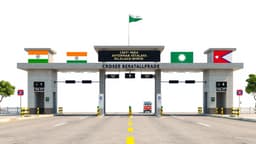Home / Environment / Bangladeshi Families Flee Homes as Brahmaputra River Devours Land
Bangladeshi Families Flee Homes as Brahmaputra River Devours Land
10 Nov, 2025
Summary
- Hundreds of families in northern Bangladesh lose homes and land to river erosion
- Farmer Nurun Nabi has had to move his home twice in a year as the river advances
- Locals describe constant struggle to rebuild after the river takes everything
As of November 10th, 2025, the people of northern Bangladesh's Kurigram district continue to face a relentless battle against the encroaching Brahmaputra River. Fueled by the effects of climate change, the river has become increasingly unpredictable, eroding land and homes at a faster pace than ever before.
Nurun Nabi, a 50-year-old farmer and father of four, is just one of hundreds forced to repeatedly relocate. He has already had to move his home, built just a year ago on a fragile river island, as the water steadily advances. "The river is coming closer every day," Nabi says, his voice weary with exhaustion. "We are born to suffer. Our struggle is never-ending."
Across the region, families are losing not only their homes but also their rice and lentil fields, livestock, and other assets as the Brahmaputra, Teesta, and Dharla rivers continue to devour the land. The temporary river islands, or "chars," where many reside are among the most vulnerable areas, with residents forced to rebuild time and again only to see their efforts washed away.

